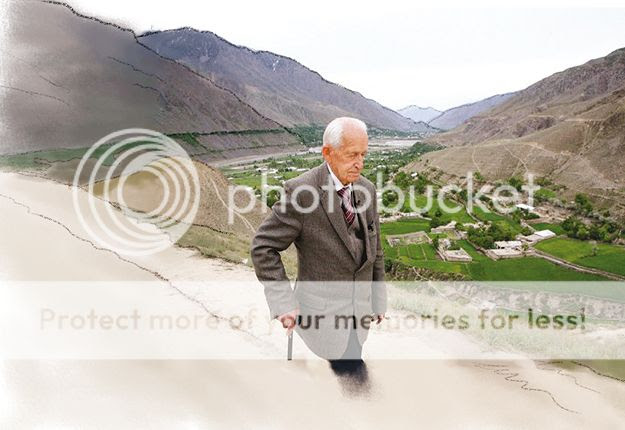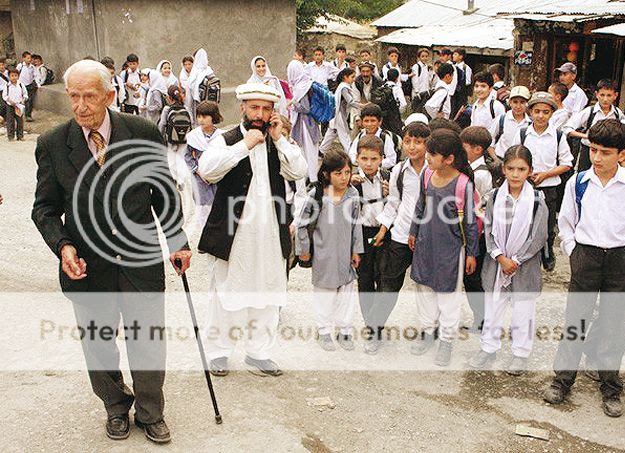
The story of the Englishman whose heart lies in Pakistan. DESIGN BY MUNIRA ABBAS
When the young orphan from Yorkshire decided to take charge of his life at the age of 12, he could have never imagined that his decisions would lead him to influence the lives of so many in a country that was yet to be conceived. For the young boy, the logic had been extremely simple — since people’s kindness had helped him through the darkest hours of his life, he had to return the favour. Now more than eight decades later, just shy of his centenary, Major Geoffrey Douglas Langlands is an institution rich with stories and an understanding of the people and the country he once witnessed coming to life in 1947.

The officer who landed in India as part of the British army has now retired in the heart of Punjab after a long teaching career in Pakistan. Having recently stepped down after running the Langlands School and College in Chitral for 24 years, Major Langlands took up residence earlier this year at the Aitchison College in Lahore — a place far too familiar for someone who taught there for almost 25 years. With doors wide open, visitors (most of them being his students) are often welcomed in the suite of comfortable rooms that he lives in now. The prominently placed white marble plaque outside his suite details all the interesting bits of his life, offering a brief insight into the intriguing personality that sits on a comfortable couch on the other side of the doors.
The words “acha acha” can be heard in the hallway leading to his suite. Seated on a sofa, he attends to one of his former students, a young girl from Chitral currently studying at the Forman Christian College, who has come down to meet him. As she leaves, he inquires how she got here. “Rickshaw,” she says. He hands her some money for the commute back to her college. His staff smiles and calls it a generous habit of Major saheb.

The news of his retirement has attracted attention from the local and international media and Major Langlands is well aware of it. Beside him, on a small coffee table lies a folded newspaper carrying an article on the role models in the country. His name is mentioned as a prime example but he laughs at being termed as a saint. “I never knew my voice was so clear,” he says recalling one of his recently televised interviews. But his memory seems equally clear. With exact dates often part of his conversation, Major Langlands has a way with narration. Not one to skim through events, each part of his life is given due credit. “You see in my life, my long life, everything that has happened is linked to prior events.”
The most striking part of his life however, is his decade long stay in a region of Pakistan that even its own citizens shy away from. From April, 1979 to September, 1989, Major Langlands spent his life in North Waziristan, the north-eastern part of Pakistan bordering Afghanistan. The newly established Cadet College Razmak at the time was looking for a principal after its first one left. “No one sensible was ready to take charge especially after the first principal described the area as a horrible place,” says Langlands. But a letter from a former student and the education secretary of the province convinced the educationist in him. “The letter read, ‘Please leave your comfortable job at Aitchison and come to a difficult job in the tribal area’ and I simply couldn’t refuse a challenge,” he says.

Langlands retired from the Langlands School and College in Chitral after serving for 24 years.
PHOTO COURTESY: CAREY SCHOFIELD
The Cadet College was shifted to Nowshera earlier this year due to growing security concerns in the area. For Major Langlands, the institution he once headed at Razmak was not just any college. “I told the locals I will treat it as a special college where good, talented students would be taught.” Besides students from the area, a quota was also set for students from other parts of the country, who would be admitted to the college on the basis of merit. “I admired those parents who were prepared to send their sons to a school in the tribal areas,” he explains.
Issues and conflicts appeared simpler in Major Langlands world. “North Waziristan was very tribal as they [locals] didn’t like anyone from outside the tribal area to come in,” he recalls. And those who did were often kidnapped for ransom. With his speck of silver hair and piercing blue eyes, he attracted all the more attention but claims he never had any issues with the locals, other than his kidnapping in 1988.
Caught in the midst of a political clash between two different groups in North Waziristan over representation in the National Assembly, he was kidnapped by one of the groups who wanted their demands to be met by General Ziaul Haq in exchange of his release. After being held hostage for six days and transferred to a no-go area within North Waziristan, he finally told his captors that he had travelled enough. “They were not used to a kidnapped person standing up for himself,” he says with a smile. The next day, he recalls, they served him tea and boiled eggs for breakfast. Soon senior tribal leaders got involved and he was released on the condition that the kidnappers would not be apprehended. “The leaders said, ‘You simply can’t kidnap the principal!’”

The number of students at the Langlands School and College increased from 80 to 1,000 during Langlands’ time.
PHOTO COURTESY: LANGLANDS SCHOOL AND COLLEGE
He seems to understand the tribal mindset. “I got along with the tribals just by being nice to them,” he says in a matter-of-fact tone. “Most people don’t realise just how completely the tribals are on their own, with no laws and no police.” The provincial government wanted to transfer him from Razmak after the kidnapping but it never materialised. “Had they asked me I would have definitely said no.” But didn’t the incident scare him? “No. Nothing scares me,” he chuckles.
And if you know his journey, you will understand why. “I was born at a time when everyone was miserable,” he recalls. Born in 1917, during the First World War, he and his elder twin brother were 10 minutes apart. Followed by the birth of a younger sister next year, the Langlands’ household was struck with grief, as their father died just five days after the birth of their youngest child. From Yorkshire, the children travelled with their mother, a classical folkdance school teacher, to their grandparents’ house in Bristol. At the age of 11, they lost their mother to cancer too and were left under the care of their grandfather. The next year, their grandfather, who was also the last adult in the family passed away.

As the orphan twins struggled to cope with the situation, Langlands’ elder brother landed a scholarship in an orphan school in Bristol. Soon after, the principal of a public school in Tauton, an old teaching acquaintance of his mother, managed to collect money to get the younger Langlands’ in school too. The next six years shaped him into the man that changed the lives of thousands of students in the years to come. “Those six years of schooling made me very confident. I witnessed that while I could have been placed in an orphanage, people helped me in my upbringing so that I get good education. Things like these stay with you.”
His teaching career began in London in 1936, at the age of 18. He started by teaching the second grade and soon mastered the art of making the dullest subjects interesting for his students. English has always been his primary medium of communication regardless of where he is in the world. He learnt Urdu but refused to use it. “The only way to get people to learn a language was to speak in that language all the time.”
Just as Langlands was settling into this life, the world changed again. On September 3, 1939, Langlands — by then a young school teacher — heard Prime Minister Neville Chamberlain announce that Britain was at war with Germany. He immediately signed up to be an ordinary recruit in the British army. “I thought my (my)! This was going to change everything. I decided I wanted to be in the war right away.” Making his way into the British army commandos based in England, he was later part of the force that carried out raids on the French and Belgium coasts.
In 1943, during his officer training in Kent, when the army was looking for young army volunteers for India, Langlands did not hesitate. In January 1944, he finally arrived in India and spent the next three years in the army as part of the selection board for officers training in Bangalore.
Langlands’ life as a British army officer was to change in 1947. “Then came along the day Mountbatten was eager to hand over power. British officers were asked to volunteer to stay for one year either in India or Pakistan.” Even though he had never served in the areas that were to constitute an infant Pakistan, he was eager to join the Pakistan army. “I knew that Pakistan would have great difficulties in establishing itself because India was deadly against it. I wanted to help them and that has been my job ever since.” He travelled to Rawalpindi on August 12, 1947, just days before the Partition.
While not many British officers chose to stay back in Pakistan, Langlands recalls that the one-year contract by the British government was cancelled by Pakistan in December, 1947. “We were told that the Pakistani government will give a two or three year contract from January 1, 1948, to British officers they wanted to keep.” Langlands was awarded a three-year contract followed by another one. At the end of those six years, the commander-in-chief of the Pakistan army at the time, General Ayub Khan expressed his desire to retain Major Langlands. But with the Pakistani government only extending contracts to specialists in engineering and medicine, it was unlikely that Langlands would get another extension. “Then he [Ayub Khan] says to me ‘don’t go back to England we need people like you in Pakistan. You can help us a lot’ and then and there I said I will stay.”
Although he had never thought of leaving the Pakistan Army, staying in Pakistan was never a part of the bigger plan either. “But then everyone wanted to help. I had been on my own all my life really,” he says. “I wanted to do good because various people had looked after me. I wanted to make use of my life.” Three days after his decision to stay back in Pakistan, Langlands was offered a teaching job at the Aitchison College, where he had the likes of Imran Khan and Zafarullah Khan Jamali in his tutelage. The next 25 years were spent teaching at Aitchison until he retired and took up another stint in the education sector.

A white marble plaque detailing the interesting bits of Geoffrey Langlands’ life. PHOTO: ABID NAWAZ
After serving as a principal in the tumultuous terrain of North Waziristan for a decade, the next challenge was in the serene mountains of Chitral where he set up the Langlands School and College and headed it for the next 24 years. The institution lived up to its motto ‘There is always room for improvement’ and empowered hundreds of young boys and girls over the years. Having started with merely 80 students, it now educates as many as 1,000 students each year. While the people of Chitral are deeply grateful to this Britisher for bringing a new world to their children, Langlands attributes all the credit to the people. “The people loved the institution, they wanted education for their children and they worked to materialise their desire,” he says.
Langlands never married and his twin brother has only visited him a handful of times in Pakistan. The vacuum of family in his life seems to have been consumed by a love far greater than a desire for personal fulfillment. “Right from the age of 12, all the decisions in my life have been taken by me. I am not sure if that’s a good thing but that is something I did. I decided that I have to do good to people in the world simply because people have been good to me.” And that is precisely what he did.
The Langlands School and College has found a new English principal in Carey Schofields, a writer and journalist who has covered everything from Mick Jagger to the Pakistan Army. But it might be impossible for Pakistan to find a replacement for the crisp Englishman who not only devoted his life to a country that did not bind him by blood or birth but has also chosen it as his final resting place.
Some of the photographs were provided by The Citizens Archive of Pakistan, and are drawn from material obtained as part of its Oral History Project.




